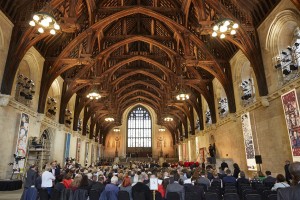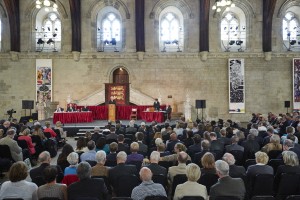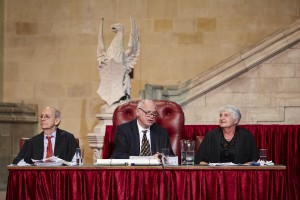Treason? The Trial of the Magna Carta Barons
26 Wednesday Aug 2015
Toby Lovett, Olswang LLP News Articles
Share it
 On the last day of the Trinity Term, and as part of the ongoing celebrations commemorating the 800th anniversary of the sealing of the Great Charter, Westminster Hall served as a fitting venue for a “mock trial”, which saw the twenty-five Barons of Runnymede standing in the dock on an indictment of treason, witnessed by 800 members of the public.
On the last day of the Trinity Term, and as part of the ongoing celebrations commemorating the 800th anniversary of the sealing of the Great Charter, Westminster Hall served as a fitting venue for a “mock trial”, which saw the twenty-five Barons of Runnymede standing in the dock on an indictment of treason, witnessed by 800 members of the public.
Going back some 800 years…
It has been over three months since King John agreed to the terms of the Magna Carta, which inter alia limited the King’s powers of taxation, gave freedom to the church and protected the liberties of London and other towns.
But arguably the most important provision of the Great Charter is clause 61: the so-called security clause. In this, the King has conceded that twenty-five barons of the realm shall be elected “who with all their might are to observe, maintain and cause to be observed the peace and liberties which we have granted”; infringement of the charter’s terms which is notified to four of the committee and goes without remedy for forty days will empower the full committee to “distrain and distress [him] in every way they can” until he makes amends.
At the time of this trial, near the end of September 1215, tensions between the barons and the King are running high. A letter from Pope Innocent III (with whom King John has a fractious relationship) is on its way to quash the Charter and excommunicate the barons. Nevertheless, the barons have refused to surrender London as originally agreed and are considering to depose the King altogether. King John has therefore decided to charge the barons with treason.
A detailed history of the Charter can be found in a speech made by Lord Neuberger in Guildford Cathedral on 18 June 2015.
The participants
Standing as the primary defendant was Baron FitzWalter (played by Professor David Carpenter, professor of Medieval History at King’s College London) with members of the audience encouraged to stand in the dock as the other twenty-four (possibly to their detriment!) Giving evidence alongside him was Stephen Langton (played by Lord Lisvane), Archbishop of Canterbury at the time of the trial. Counsel for the Defence was Nathalie Lieven QC.
 Witnesses for the prosecution comprised William Marshal, Earl of Pembroke (played by Lord Judge), eulogised by Stephan Langton as “the best knight that ever lived”, and a defiant King John (played by Clive Anderson), confident that his court would come to the “right decision”. Counsel for the prosecution was James Eadie QC.
Witnesses for the prosecution comprised William Marshal, Earl of Pembroke (played by Lord Judge), eulogised by Stephan Langton as “the best knight that ever lived”, and a defiant King John (played by Clive Anderson), confident that his court would come to the “right decision”. Counsel for the prosecution was James Eadie QC.
Presiding over the trial were three distinguished Justices: Lord Neuberger, President of the Supreme Court of the United Kingdom; Dame Sian Elias, Chief Justice of the Supreme Court of New Zealand; and Justice Stephen Breyer, Associate Justice of the Supreme Court of the United States.
The trial
The trial began with a procession of Serjeants at Arms from the Commonwealth and the United States of America followed by an introduction from narrator Gavin Esler and the reading of the charges.
The case made by the prosecution was that King John had been forced to sign the Charter under duress, making the terms of it unenforceable. It also submitted that various acts by the barons, including an attempt to replace King John with Prince Louis of France, were clear acts of treason and were not justifiable.
The defence put forward by the accused was that King John was a tyrant, whose “crimes were endless” and who imposed exorbitant taxes on his subjects. The barons therefore had no choice but to undertake a “pre-authorised rebellion” by threatening to depose of the King and make him sign the Charter.
The witnesses were then called in turn and throughout the examination and cross-examination an excellent balance was struck between the narrative of the Magna Carta and a legal analysis of the provisions therein, especially as regards the security clause. There were also some witty references made to modern legal day issues, such as the role of the European Courts and the devolution of powers to Scotland and Wales, to the amusement of the audience.
After closing statements the Justices retired to confer, during which time the members of the audience were treated to a performance from The Berkeley Ensemble.
The verdict
Requiring a mere four minutes to deliberate before returning to give their verdict, the Justices found the twenty-five Barons of Runneymede on the indictment of treason, by unanimous decision, not guilty.
The Justices proceeded to give their concurring judgements in turn. Firstly, Dame Elias dismissed the  prosecution’s claim that the Charter was void for duress and held that it had not successfully proved that there was no justification for the barons’ actions. Indeed, self-help in this case did not amount to treason. She then went on to discuss the underlying themes in the Magna Carta and their universal nature. Justice Breyer agreed that the prosecution had not made out a clear enough case for treason before going on to examine the more difficult issue of the security clause. By comparing it to the modern day role of the separation of powers, he opined that such a clause was a necessary as a check on the King in order to ensure its provisions were properly observed. He then spoke about the educational element of the Charter for successive governments.
prosecution’s claim that the Charter was void for duress and held that it had not successfully proved that there was no justification for the barons’ actions. Indeed, self-help in this case did not amount to treason. She then went on to discuss the underlying themes in the Magna Carta and their universal nature. Justice Breyer agreed that the prosecution had not made out a clear enough case for treason before going on to examine the more difficult issue of the security clause. By comparing it to the modern day role of the separation of powers, he opined that such a clause was a necessary as a check on the King in order to ensure its provisions were properly observed. He then spoke about the educational element of the Charter for successive governments.
Finally, Lord Neuberger summed up the judgment by quickly analysing the different forms of treason that could have been established but concluded that these had not been made out successfully and the accused should be acquitted. The official Supreme Court press release exonerating the barons can be read here.
The legacy
After judgment, Gavin Esler concluded the evening by giving a brief account of the Magna Carta and its various subsequent adoptions throughout the years after September 1215, describing it as the “foundation stone for the liberty of many millions of citizens across the world.”
The event proved both entertaining and informative and resulted in an outcome that all had hoped for (with, of course, the exception of the King!). To read more about the history of the Magna Carta and its legacy, visit http://magnacarta800th.com/.


